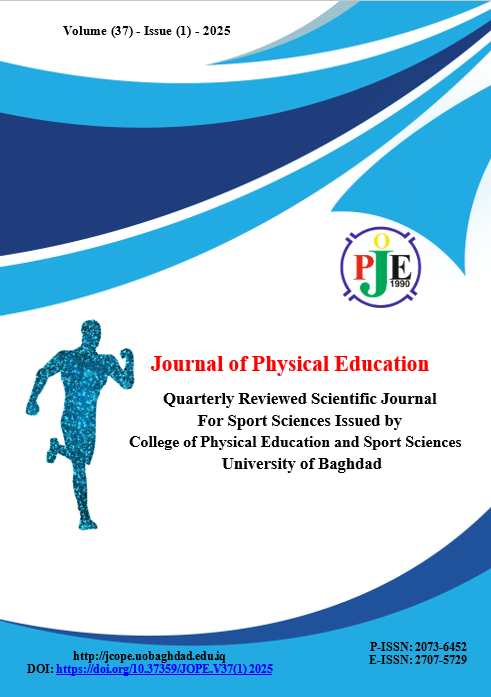The Reality of Smart Leadership in the Iraqi Basketball Federation in Organizing Tournaments and Matches from Workers’ Perspectives
DOI:
https://doi.org/10.37359/JOPE.V37(1)2025.2058Keywords:
Smart Leadership, Tournaments Organization, Iraqi Basketball FederationAbstract
This study aimed to identify the level of smart leadership in organizing basketball tournaments and matches from the point of view of those working on its management. A descriptive correlational design was used to guide his study. The limits of the research community are represented by those working on the management of the Iraqi Basketball Federation championships including (head and members of sub-federations, committees, local referees, coaches, and administrators of clubs) for the sports season (2023-2024) in 14 Iraqi governorates, except Kurdistan Region (N = 557). The main research sample is 267 individuals who were selected for application who account for (47.935%) of this community. After determining the measurement tool, the researchers conducted the survey by applying the smart leadership scale in organizing basketball tournaments and matches on the members of the application sample by conducting the main survey on them and directly measuring them in a collective and individual manner for the period from December 3rd, 2023 to January 4th, 2024. After collecting the data and statistically processing it with the SPSS, the conclusions and recommendations were that the tournaments and matches organizers of the Iraqi Basketball Federation have a positively acceptable level of smart leadership from the point of view of those working on managing the Iraqi Basketball Federation championships. The point of view of those working on managing the Iraqi Basketball Federation championships has achieved an advanced level of organizational intelligence among those in charge of organizing the Iraqi Basketball Federation tournaments that raise the level of smart leadership they have.
The point of view of those working on managing the Iraqi Basketball Federation championships has achieved an advanced level of organizational intelligence among those responsible for organizing the Iraqi Basketball Federation tournaments that raise the level of smart leadership they have. Raising the level of smart leadership in organizing basketball tournaments and matches requires increased attention to supporting emotional intelligence, according to the point of view of those working on managing the Iraqi Basketball Federation's championships. It is necessary to work to empower those responsible for organizing the Iraqi Basketball Federation championships to raise the level of emotional intelligence because of its importance in raising the level of smart leadership for them. The Iraqi Basketball Association needs to take care in accrediting qualified academics specialized in sports management, adopting opportunities to develop the capabilities of those responsible for organizing the Iraqi Basketball Federation championships.
References
Adeleke Akinniyi A. (2013), Knowledge Management Practices And Organisational Performance of Manufacturing Industry In NIGERIA, Archival & Information Studies, faculty of education, university of ibadan, NIGERIA.
Baslama Abdullah bin Omar. (2022). Administrative creativity among supervisors of recreational activities for leisure time in sports clubs in Medina: Journal of the Faculty of Physical Education, University of Baghdad. Volume (34) Issue (1).
Bilal Kamel Odeh Zubaidi. (2010). The influence of emotional intelligence and transformational leadership on organizational performance. Master Thesis: College of Administration and Economics. University of Baghdad. Department of Business Administration.
Chase, R, Aquilano, N. & Jacobs, R, (2011). Operations Management for Competitive Advantage, (New York: McGraw-Hill–Inc).
Fouad Hammoudi Al-Attar, Hazem Rabah, Najm Al-Ghunaimawi, & Jassim Rahi Kazim. (2020). Smart leadership and its role in achieving organizational prosperity: An analytical study in the Wasit Health Department). Wasit Journal for Humanities and Social Sciences, Issue (45), Volume (16).
Hana Khaled Al-Raqqad and Aziza Abu Dayyeh. (2012). Emotional intelligence among academic leaders in public Jordanian universities and its relationship to organizational citizenship behavior among faculty members. journal of the Islamic university for educational and psychological studies, Vol. (2). Issue (20).
https://jcope.uobaghdad.edu.iq/index.php/jcope/article/view/1231/1061
Jawad Kadhim, M., & Salman Ahmed, W. (2016). Evaluating Training Program Using Physiological and Biochemical, and Physical Indicators On National Artistic Gymnastics League For Men. Journal of Physical Education, 28(3), 116–129. https://doi.org/10.37359/JOPE.V28(3)2016.1064
Kadhim, M. J. (2023). Evaluation Of The Existence Of Gender Disparities In Iraq. International Journal of Social Trends, 1(1), 10–16.
Kadhim, M. J. (2024). Social Networks’ Place in Contemporary Political Movements. International Journal of Social Trends, 2(2), 51–59.
Kadhim, M. J., & Mousa, A. M. (2024). The use of an innovative device to improve the efficiency of the posterior quadriceps muscle of the man after the anterior cruciate ligament injury of advanced soccer players. Journal of Physical Education (20736452), 36(1).
Khalil Mikhail Moawad. (2010). Mental abilities. 5th ed. Egypt: Alexandria Book Center.
Khorakian, A., Nosrati, S., & Eslami, G. (2018). Conflict at work, job embeddedness, and their effects on intention to quit among women employed in travel agencies: Evidence from a religious city in a developing country. International Journal of Tourism Research, 20(2).
Marwan Khaled Mustafa. (2016). Influential leader skills – "Advanced Level" Model of Cosus and Posner.
Mcshane, Steven L. and Von Glinow, Mary Ann, (2008). Organization Behavior, 4th edition, McGraw-hill international edition, New york.
Mohamed Tahir Boubaya. (2009). Attitudes of the middle administrative body towards organizational culture models. Master Thesis: Department of Organization and Work Psychology. Institute of Psychology and Educational Sciences. University of Algiers
Mohammed Hassan Allawi. (2005). The psychology of sports leadership. i(2). Cairo: Dar Al-Kitab for Publishing.
Quinn, J, (2005). The Intelligent Enterprise a New Paradigm . Academy of Management Executive, 6 (4(.
Saja Hussein Al-Garawi. (2016). The Influence of intelligent leadership on smart organizations by enhancing organizational learning. Master's Thesis: University of Al-Qadisiyah. College of Business and Economics
Salah Abdul-Qader Al-Nuaimi. (2008). Leading Manager and Strategic Thinker. Oman: Ithra Publishing & Distribution.
Salama Hussein & Taha Hussein. (2006). Emotional intelligence for educational leadership. Alexandria: Dar Al-Wafa for Printing and Publishing
Siham Mirdad. (2018). Glossary of Terms in Education. Amman: Dar Wael for Publishing and Distribution.
Siriwardanagea. N & Oduor. E. (2010), Intelligent Interface for Crisis management. Master Thesis, Chalmers University of Technology, Sweden.
Susan Kahale. (2019). Educational Administration. Amman: Wael Publishing House.
Tariq Al-Badri. (2002). Fundamentals in the science of leadership management. 1st ed. Amman: Dar Al-Fikr Al-Arabi
Downloads
Published
Issue
Section
License
Copyright (c) 2025 Journal of Physical Education

This work is licensed under a Creative Commons Attribution-NonCommercial 4.0 International License.






 The Journal of Physical Education (JOPE) applies a Creative Commons Attribution 4.0 International license (CC BY 4.0), which lets others distribute, remix, tweak, and build upon your work, even commercially, as long as they credit you for the original creation. For more information, click the link :
The Journal of Physical Education (JOPE) applies a Creative Commons Attribution 4.0 International license (CC BY 4.0), which lets others distribute, remix, tweak, and build upon your work, even commercially, as long as they credit you for the original creation. For more information, click the link : 